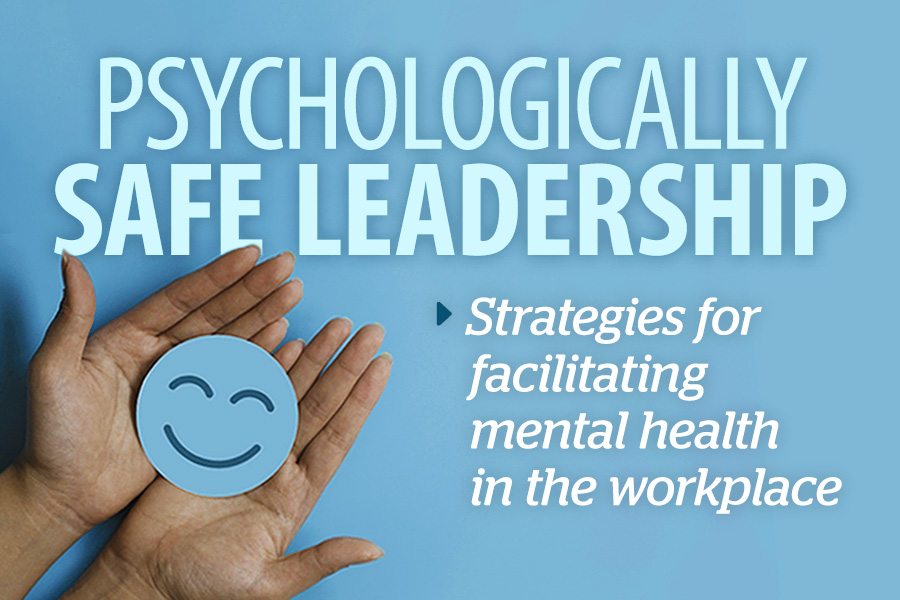
Emotional literacy is a core competency for psychologically safe leaders
By Bill Howatt and Troy Winters
Those who care how their behaviour impacts others and manage their emotions under pressure are more in tune with their feelings

EDITOR’S NOTE: ‘Psychologically Safe Leadership: Strategies for facilitating mental health in the workplace’ is a web series in partnership with Dr. Bill Howatt of Howatt HR Consulting in Ottawa, and Troy Winters, senior health and safety officer at the Canadian Union of Public Employees (CUPE) in Ottawa.
“Leaders who notice and acknowledge employees’ emotions are more in tune with employees’ concerns around fear.” – Dr. Bill Howatt
Psychologically safe leaders who understand the benefits of emotional literacy play a critical role in workplace culture by driving out fear.
Emotional literacy is the ability to notice and manage emotions without losing one’s temper or otherwise reacting in a way that could negatively impact employees’ experience.
Coined in 1960 by Nancy Graham, emotional literacy was popularized by the work of Claude Steiner and Marshall Rosenberg, among others.
Steiner’s notes suggest: “Emotional literacy is a source of personal power (that is) indispensable for success in today’s world.”
Leaders who care how their behaviour impacts others and manage their emotions under pressure are more in tune with their feelings.
Employees are not cognitive machines programmed to have only positive emotions. All employees, including leaders, need to navigate unpleasant (negative) and pleasant (positive) emotions to perform to their full potential.
One societal challenge is that most leaders and employees have never learned to navigate unpleasant emotions proactively. The result is unpleasant emotions often drive reactive behaviours or a need to self-protect and hide emotions.
Leaders who understand emotional literacy know that emotions are not the problem; it is how they are handled. When leaders can adequately react to their emotions, they are better positioned to support their teams through challenging moments.
Psychologically Safe Workplace Awards provide employers tools, data on mental health
Four microskills that can help leaders develop their emotional literacy:
Becoming self-aware of emotions to know and acknowledge your feelings: Self-awareness is not just about knowing your emotions; it is about understanding why you feel them and knowing how your expressed emotions impact others.
People who practice can become more aware of their emotions. By realizing and accepting the negative thoughts that affect emotions and understanding how negative emotions can influence their actions, leaders can avoid allowing their emotions to make a situation worse, regardless of how they are feeling.
Keep track of your experience, such as through journaling, so that you can monitor your progress.
Self-regulation of your (immediate) reaction: As crucial as recognizing and accepting emotion is, you must not reside on the other end of the spectrum where emotions rule your actions, and you abandon all reason. Allowing instantaneous, negative psychological reactions to guide your actions often creates negative situations or makes situations worse.
Unpleasant emotions are nothing more than the brain sending a signal that has a physiological and psychological reaction. It does not control behaviour or choices; it only influences them.
Negative emotions happen. They are a part of life over which we have limited control. We control whether we accept them and feed them our energy (which may feel great in the heat of the moment) or take reasonable steps to avoid overreacting or fearing them.
Having and showing empathy: The ability to understand or share your team’s feelings is an essential skill for leaders to ensure a psychologically safe workplace.
Try to place yourself in their shoes. Leaders who can show empathy understand the emotions their team members are feeling.
Reading body language and detecting tone while listening to words provide cues about how people are feeling. Train and encourage your leaders to talk to their teams.
Admitting faults and repairing hurt feelings: Admitting when you were wrong or acted incorrectly is a core part of a psychologically safe leader.
As you strive to be more emotionally literate and practice the skills described here, you will make mistakes. Old habits are hard to break, and new, positive habits take time to develop.
Admitting you were wrong may make you feel uncomfortable, but the sooner it is done, the easier it will be, and the more likely it will be accepted.
Ensure your tone matches the context, and that you are sincere.
 Dr. Bill Howatt is the Ottawa-based president of Howatt HR Consulting in Ottawa.
Dr. Bill Howatt is the Ottawa-based president of Howatt HR Consulting in Ottawa.

Troy Winters is a senior health and safety officer at the Canadian Union of Public Employees (CUPE) in Ottawa.